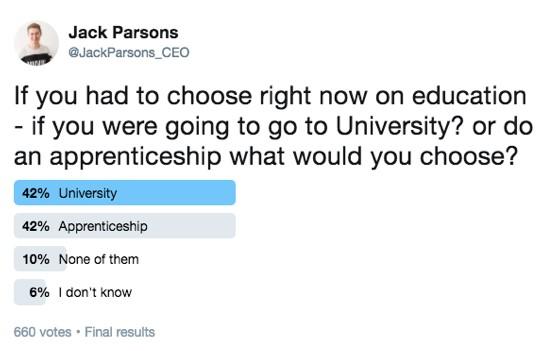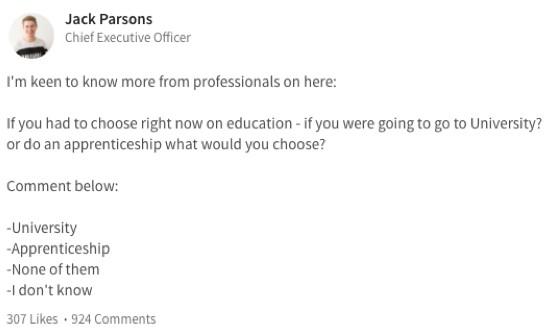Understanding tomorrow’s talent
Whilst both a degree and an apprenticeship can offer great opportunities, millennials are faced with a tough decision. Do they go straight into full-time work? Apply for (often unpaid) internships to scrape together some work experience? Do they study for a degree without the guarantee of a job? Or take a low-paid apprenticeship route instead? Phew!
The number of young people in Britain who spend long periods neither working nor studying has increased in the past year.
According to the Office of National Statistics (ONS), over 811,000 16-24 year olds in the UK have been labelled a ‘NEET’ for more than one year. This is 100,000 more than last year. A ‘NEET’ being a young person who is not in employment, education or training.
Why is this happening?!
University vs Apprenticeships
Whilst thousands of young people are nervously awaiting the results of their GCSEs and A-Levels, I used my Twitter and LinkedIn networks to ask people what education route people they would opt for right now, if they had the choice. Whether they would study at university or take on an apprenticeship. 660 people responded on Twitter. Whilst 10% said they’d do neither, both university and apprenticeships came out equal at 42%!
 It is clear millennials are now weighing up other options.
It is clear millennials are now weighing up other options.
A university degree was once considered a one-way ticket to a great, successful career. However, the number of people applying for UK university places has fallen by more than 25,000 (4%) in the last year, according to UCAS. In July, National Statistics Office data reported that 879,500 apprenticeships have been reported so far in 2016/17, compared to 814,400 at this time in 2015/16. An increase of 8%.
But what does this mean in reality for young people’s future prospects? Do working professionals feel that a degree or an apprenticeship is more worthwhile than the other? I turned to LinkedIn to ask my network what education route they would choose now if they had their time again.
With over 900 comments, the results were mixed. But apprenticeships seemed to just pip universities to the post! Most comments were based on people’s own experience. Many agreed that whilst university offers life skills and knowledge, apprenticeships are more flexible and allowed people to learn on the job whilst getting paid.
“Apprenticeship schemes are great for business, whom are looking to develop and invest in their staff.”
“I went to university but still felt a bit clueless and wasn’t confident about entering the professional world! Nothing beats on the job experience. I’d definitely do an apprenticeship.”
“As someone that started out with an apprenticeship and because of a poor training provider/employer, wasted the best part of a year. I would say I’ve progressed a lot further with my career due to studying at university than I would’ve done with the apprenticeship.”
“University with an internship ‘gap’ year”
“Apprenticeships – the backbone of long term employee engagement”
“Apprenticeship every time. Employers are looking for real world skills. Qualifications are great but there’s no substitute for experience.”
Best of both worlds?
Attitudes towards apprenticeships and degrees are changing. One comment that really caught my attention was when someone suggested doing ‘both’. An apprenticeship and a degree. The stereotype which saw apprenticeships being mainly for manual, trade jobs and university for the professions no longer stands true. Universities are catering more and more for more vocational courses, whilst apprenticeships are now being offered by some of the country’s most well-known employers.
Some universities are starting to see the benefits of combining both a degree and an apprenticeship. The UK’s first ever degree apprentices recently graduated from Aston University, in a unique partnership formed between the university’s School of Engineering and Applied Science, and Capgemini a global consulting, technology and outsourcing company.
The partnership offers young people the chance to gain a degree whilst employed in industry, with their tuition fees paid by the employer. An ideal middle-ground for those who want to study and learn on the job without the stress of debt.
What is the government doing to help?
The government has committed to creating three million new apprenticeships by 2020, paid for in part by a new employer levy introduced in April this year.
Businesses expect numbers of apprenticeships to rise this year by 59%, boosted by the new levy. Research from the Association of Graduate Recruiters (AGR) shows employers, including Unilever, Jaguar Land Rover and auditors KPMG, are offering more schemes.
On LinkedIn, several people mentioned they took on an apprenticeship which led them to study a degree. Others said they took on an apprenticeship then decided to freelance. Whilst I’m not here to advise people on what career route to go for, it’s clear that there are more options than ever before.
What can you do to help?
With so many options to choose from, young people need support and guidance. Rather than being pushed down one route, they need to be explained the benefits and pitfalls of all the options. At the end of the day, it all comes down to young people choosing something they are passionate about.
The land of employment is changing. Embrace Generation Y’s passion and drive and encourage them to take a path that will allow them to build upon their skills. After all, 75 per cent of the global workforce will be made up of millennials by 2025.
Jack Parsons, CEO at yourfeed

Responses